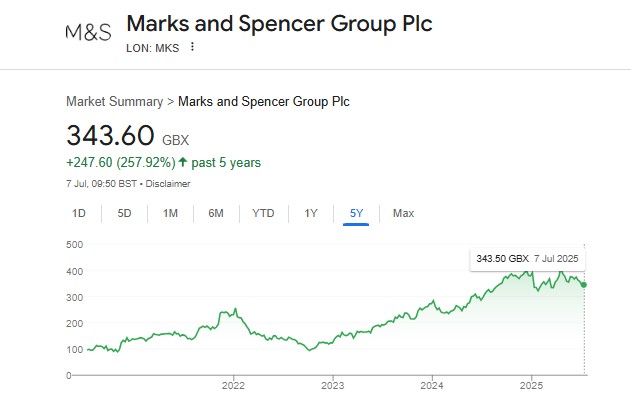Ask a random person on the street about Marks & Spencer and their response is likely to include a reference to the recent cyber-attack that has exacted a heavy toll on the business. As well as impacting massively on its operational abilities and therefore profits, it also pretty much stole the narrative around the retailer.
There is no doubt that since Stuart Machin was appointed chief executive of M&S in mid-2022, he has given a masterclass in controlling the storyline around the business. His communications to employees, shareholders, media and customers have been nothing short of world class.
A critical factor in his engineering an amazing turnaround at the company, which has seen its share price rise from a low of 90p at end-November 2022 to a high of more than 400p before the cyber-attack, has been down to the clarity of the story he has told to all stakeholders at each step of the company’s journey to recovery.
The value of a powerful narrative had become increasingly important to companies from all sectors, and this very much includes the hospitality industry. This can encompass highlighting the values of the business, such as its stance on issues around sustainability, but increasingly, it has also come to involve storytelling. People want to know the provenance around businesses. What’s the idea behind a restaurant, the food, the concept and the founders’ pedigree, among other things?
Whether this story is true or a well-crafted fairytale is largely immaterial, it just needs people to buy into the reality or the fiction. Sitting atop the tree of storytelling is, arguably, Dishoom. The company writes an incredibly rich back story for each of its restaurants. In the early days, the founders handled this process, but it has become tougher as the business has grown.
Shamil Thakrar, co-founder of Dishoom, told the audience at the Propel Multi-Club Conference earlier this year that a creative team now writes the stories and also sources the furniture and artefacts. A 50-page design guide is produced to deliver on the individual stories for each outlet. The forthcoming Glasgow restaurant will be centred on a spy from India, while the recently opened Permit Room in London’s Notting Hill is based around the story of an artist who drinks a lot.
Thakrar firmly believes that all this effort underpins the business. He said: “It all changes the experience. That’s what hospitality does. It’s the culture of the business, and the chefs cook better food if they are inspired by the culture. It’s the same with the servers.”
If anybody is in any doubt about the value of all this effort, then consider the rumours suggesting the valuation of Dishoom in its current funding round has hit £350m. For 14 sites, all leaseholds, this is pretty good going.
But it’s not easy. Consider the experience of Harneet Baweja, founder of the Gunpowder chain of restaurants, who recognised the value of having a storyline when he opened the Empire Empire restaurant in 2023 in Notting Hill and injected a disco theme to the venue, harking back to the carefree days of youth. However, he had soon had reservations about the move when Jimi Famurewa reviewed it for The Standard and gave him a roasting for not having committed more fully to the concept.
He’s the first to admit he’s not a fantastic storyteller and that developing rich storylines doesn’t come cheap – with investment required in the art, written content, fit-outs, marketing collateral and PR output. But, even so, Baweja does have some concerns that establishments now seem to need a storyline in order to succeed.
The downside to this is that many restaurateurs are, therefore, more focused on feeding diners a narrative than serving them decent food. Maybe this should not be too great a surprise, because a mindset of style over substance sits very comfortably within the current criteria for success determined by dishes going viral on Instagram and TikTok.
The great risk here is that visuals and stories can sometimes win out over whether the food and the service is actually any good. Those for whom storytelling doesn’t come so naturally will be hoping that such a vacuous situation has a finite lifespan.
Glynn Davis, editor, Retail Insider
This piece was originally published on Propel Info where Glynn Davis writes a regular Friday opinion piece. Retail Insider would like to thank Propel for allowing the reproduction of this column.


